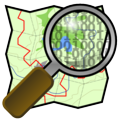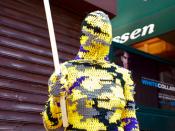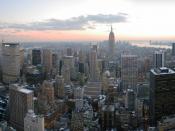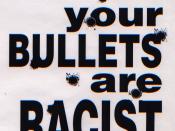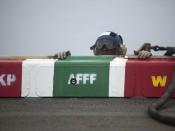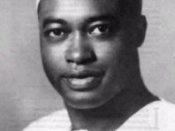On September 2, 1975 in the village of Sinoe, Liberia, West Africa Amadou Diallo was born. Growing up he loved reading, listening to music, dancing and sports. Amadou had a passion for school and attended some of the finest schools in the world, including The French International School, London's Cambridge University, The British Consulate College in Thailand and the Asian Institute of Microsoft. He hoped to enroll in a school in the United States one day. When he moved to New York he was a delivery man, but later became a street peddler selling gloves, socks, and video tapes in Manhattan on fourteenth street. He worked six days a week twelve hours a day. Diallo and his half brothers hoped one day to open up a shop selling silver and gold in New York. Plans for his future were cut short on the night of February 4, 1999.
While returning to his apartment at 12:45 an unmarked car pulled up and four plain clothes policemen got out to approach Diallo.
The police attempted to question Diallo, who they said declined to respond to their inquires and then reached into his back pocket. One of the officers saw and object and thought it was a gun. Feeling that their lives were in danger they began to firing there weapons. In all, forty-one shots were discharged. Nineteen of those bullets hit Diallo, causing him to collapse against the door of his building. He died instantly, there was no weapon found at the scene the object was found out to be Diallo's wallet.
The shooting set off a firestorm of protest in New York City. Critics expressed that the police had acted without restraint and with insufficient concern for the life of a poor black street merchant. Police defended their methods as necessary and proper in the fight against crime. New York's mayor, Rudolph W. Giuliani, became the focus of a massive civil rights campaign designed to highlight the issues of police brutality. Everyone began choosing sides. Black leaders staged a three week protest outside City Hall. Many were arrested including Rev. Al Sharpton, Rev. Jesse Jackson, NAACP president Kweisi Mfume, former New York mayor David Dinkins, and actress Susan Sarandon. Rev Al Sharpton stepped up as a leader of the protesters, and began a heated debate with the mayor.
The four police officers Sean Carroll, Edward McMellan, Kenneth Boss and Richard Murphy all shot at Diallo. Two of the officers emptied the clips of their semi-automatic pistols, shooting sixteen times each, the other two officers shot four and five times each. Out of the four officers involved three of them have prior records of shootings. Two of the cases have been resolved and the third is still under investigation. On March 25 Bronx grand jury indicted the officers on charges of second -degree murder and reckless endangerment. On December 16 a New York appellate court ordered a change of venue to Albany , New York, stating that pretrial publicity had made a fair trial in New York City impossible. On February 25, 2000 after two days of deliberations, a jury acquitted the officers of all charges.
Diallo's death, the change of venue, and the verdict each sparked massive demonstrations against police brutality and racial profiling, resulting in more then 1,,700 arrests. Charges against the protesters were later dropped. In 2001 the Justice Department announced that there would be no charges against the officers whom allegedly violated Diallo's civil rights.
On April 18,2000 Diallo's mother Kadiatou Diallo filed an 61 million dollar lawsuit against the City of New York and the officers , charges were gross negligence, wrongful death, racial profiling, and other violations of Diallo's civil rights. In March 2004 they accepted 3 million dollar settlement. Kadiatou Diallo has remained in the United States. The settlement was one of the highest against the City of New York for a single man with no dependents under New York's restrictive wrongful death law which limits damages to pecuniary loss by the decedents next of kin. Anthony H. Gair lead the council for the Diallo family, he Argued that Federal Common Law should apply pursuant to Section 1983 of the civil rights act.
On April 11, 2002, Commissioner Ray Kelly announced the Street Crime Unit would be disbanded. The unit was being disbanded not because of the Diallo case, but because there was a shortage of officers in the other areas of a shrinking police department.
References 1. February 28,2007 www.courttv.com/archive/national/1999/0205/diallo_ctv.html 2. The Amadou Diallo Educational Humanitarian & Charity Foundation February 28,2007 www.amadoudiallofoundation.org/lifehistory.hmtl 3. The Amadou Diallo Case February 28,2007 www.wsws.org/articles/2000/dia-f28_prn.shtml
